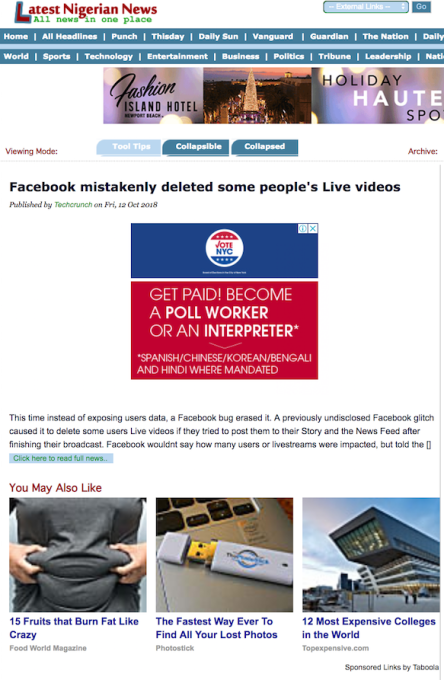Social Media
Facebook News Feed now downranks sites with stolen content

Facebook is demoting trashy news publishers and other websites that illicitly scrape and republish content from other sources with little or no modification. Today it exclusively told TechCrunch that it will show links less prominently in the News Feed if they have a combination of this new signal about content authenticity along with either clickbait headlines orlanding pages overflowing with low-quality ads. The move comes after Facebook’s surveys and in-person interviews with discovered that users hate scraped content.
If illgotten intellectual property gets less News Feed distribution, it will receive less referral traffic, earn less ad revenue, and the there’ll be less incentive for crooks to steal articles, photos, and videos in the first place. That could create an umbrella effect that improves content authenticity across the web.
And just in case the scraped profile data stolen from 29 million users in Facebook’s recent massive security breach ended up published online, Facebook would already have a policy in place to make links to it effectively disappear from the feed.
Here’s an example of the type of site that might be demoted by Facebook’s latest News Feed change. “Latet Nigerian News” scraped one of my recent TechCrunch articles, and surrounded it by tons of ads.

An ad-filled site that scraped my recent TechCrunch article. This site might be hit by a News Feed demotion
“Starting today, we’re rolling out an update so people see fewer posts that ink out to low quality sites that predominantly copy and republish content from other sites without providing unique value. We are adjusting our Publish Guidelines accordingly” Facebook wrote in an addendum to its May 2017 post about demoting sites stuffed with crappy ads. Facebook tells me the new publisher guidelines will warn news outlets to add original content or value to reposted content or invoke the social network’s wrath.
Personally, I think the importance of transparency around these topics warrants a new blog post from Facebook as well as an update to the original post linking forward to it.
So how does Facebook determine if content is stolen? It’s systems compare the main text content of a page with all other text content to find potential matches. The degree of matching is used to predict that a site stole its content. It then uses a combined classifier merging this prediction with how clickbaity a site’s headlines are plus the quality and quantity of ads on the site.
-

 Entertainment6 days ago
Entertainment6 days agoWordPress.org’s login page demands you pledge loyalty to pineapple pizza
-

 Entertainment7 days ago
Entertainment7 days agoThe 22 greatest horror films of 2024, and where to watch them
-

 Entertainment7 days ago
Entertainment7 days agoRules for blocking or going no contact after a breakup
-

 Entertainment6 days ago
Entertainment6 days ago‘Mufasa: The Lion King’ review: Can Barry Jenkins break the Disney machine?
-

 Entertainment5 days ago
Entertainment5 days agoOpenAI’s plan to make ChatGPT the ‘everything app’ has never been more clear
-

 Entertainment4 days ago
Entertainment4 days ago‘The Last Showgirl’ review: Pamela Anderson leads a shattering ensemble as an aging burlesque entertainer
-

 Entertainment5 days ago
Entertainment5 days agoHow to watch NFL Christmas Gameday and Beyoncé halftime
-

 Entertainment4 days ago
Entertainment4 days agoPolyamorous influencer breakups: What happens when hypervisible relationships end

















